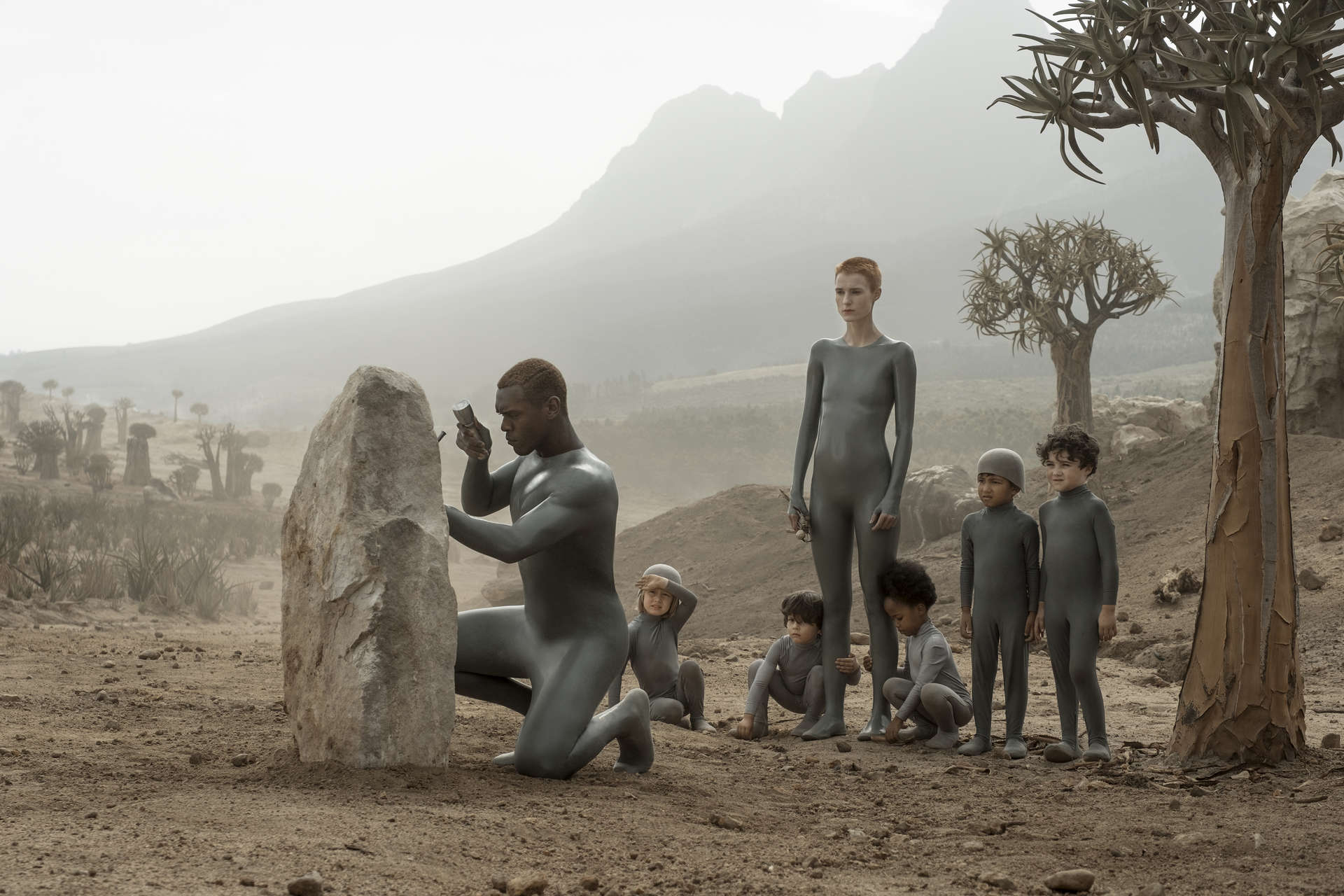What to Watch Verdict
Another heady sci-fi masterpiece from Ridley Scott, the modern master of the form.
Pros
- +
🤖 Big ideas, big swings.
- +
🤖 That hallway massacre!
- +
🤖 'Prometheus'-esque visuals.
- +
🤖 Amanda Collin does ACTING™.
Cons
- -
🤖 Slow to share the details.
This post contains spoilers for the first three episodes of Raised By Wolves.
There are two types of people in this world: those who recognize Ridley Scott’s Prometheus as a breathtaking blend of Greek tragedy and high-concept science fiction, and those who are wrong. Between Prometheus and Alien: Covenant – the second in Scott’s planned Alien prequel trilogy – the director returned to the post-human philosophy of his youth, asking big questions about fatherhood and humanity’s relationship to its creators. So it's no wonder that Raised by Wolves, the new HBOMax series from showrunner Aaron Guzikowski, feels so much like an errant thread of Scott’s cinematic universes.
Set in an undetermined future, Raised by Wolves begins with a crash. Mother (Amanda Collin) and Father (Abubakar Salim) have been sent across the galaxy to restart humanity. Tasked with incubating six human embryos, the two androids take on the roles defined by their apparent gender – one male, the other female – and get to work imparting the wisdom of humanity to their children. As time passes, however, the harshness of the world slowly kills off their wards, leaving only Campion (Winta McGrath) as the heir apparent to the homestead that Mother and Father have created.
For years, Mother and Father warn Campion that they are only the first – others will soon follow aboard the Ark, a transport ship in service of the Mithraic. The Mithraic are humanity’s one remaining superpower. On Earth, the Mithraic used Necromancers – weaponized Androids capable of wiping out entire cities with their gaze – to hunt and murder nonbelievers. Now, weary of the endless, the Mithraic look to make a clean break. They follow Mother and Father to the new planet in search of an ancient prophecy, an orphan child who will help bring about a new era of peace and prosperity for their people.
But death and destruction are habits that die hard. When a group of survivors led by soldier Marcus (Travis Fimmel) finds their way to the atheist outpost, a malfunctioning Mother resurfaces her Necromancer programming and makes short work of the scouting expedition – as well as the spaceship in orbit. With only a fraction of its population left and several of its children in the care of Mother, Marcus and the remaining survivors must face both the harshness of their new planet and the threat of a Necromancer, the greatest sin their religion ever committed.
Procreation has long been at the center of Scott’s more ambitious science fiction works, and Raised by Wolves quickly becomes a study in parentage. On the one hand, you have Mother and Father, two androids of varying origins who have been tasked to raise children in the harshest of conditions. Programmed as staunch atheists – a plot point that unfolds slowly with each passing episode – both Mother and Father are meant to empower the children they helped raise and encourage them to put faith only in themselves. In their house, religion is an unforgivable offense, and they warn their children of the day when the Mithraic believers will find their way to Kepler-22b.
While Father’s programming makes him feel more human – he is prone to telling awful jokes and worries after Mother’s increasingly irrational behavior – it is those same struggles that give Mother her power. As both her original and “adopted” children grow sick, we sense that Mother is teetering on a precipice. Her feelings for Campion are wild and uncontrollable; she would rather bring down an entire spaceship than risk being separated from her child, a course of action that, while grotesque, shows that her programming has evolved beyond the rational into something decidedly more human.
On the other side, you have Marcus and Sue (Niamh Algar), two soldiers hidden deep behind enemy lines and forced to raise a son who is not their own. Their scramble to survive leads them from the operating table to the upper echelons of the Mithraic, bound forever behind the faces of the soldiers they killed. Marcus and Sue have every reason to be cruel, but as flashbacks explore their relationship with their son Paul, we recognize the value they place on human life. Just as the Mithraic find hope in their religion, so do Marcus and Sue acknowledge the importance of making every day count with their emotionally scarred son.
One of the many strengths of Raised by Wolves is its ability to work through contradictions. Considering that the pilot ends with a spaceship crashing headfirst into the side of a mountain range and that the second episode begins with the murder of Marcus and Sue’s doppelgängers, there should be little space for redemptive story arcs. Slowly, methodically, the show starts to generate empathy on behalf of its survivors. Raised by Wolves has been compared to Battlestar Galactica, another decade-defining work of science fiction, and Guzikowski’s series seems to mimic the former in how it effectively uses flashbacks to reshape our connection to characters in real-time.
As a blend of military history, futurism, and religion, Raised by Wolves also serves to combine several threads of Ridley Scott’s career. Scott, who Executive Produced the series and directed the first two episodes, has long explored what it means to be human in both his science fiction and historical work. It is easy to see why Raised by Wolves appealed to the director: we have just begun to scratch the surface of this world, and already the show has asked big questions about the nature of man. Scott’s signature fatalism is on full display here, but as the narrative unfolds, threads of humanism being to peer through at the edges. Wherever man goes, death follows, but there are glimpses of a new generation that can move beyond the old violence of their elders (human and android).
Raised by Wolves also benefits from the long-standing partnership between Scott and cinematographer Dariusz Wolski. Wolski, who first worked with Scott on 2012’s W, has helped produce some of the most iconic landscapes in modern science fiction. In his hands, Kepler-22b represents the full promise of terraforming: both unfamiliar and possessing untapped potential. When the series steps outside of the organic – such as the first episode’s breathtaking assault by Mother on the newly arrived colonist ship – Wolski is not afraid to lean into its more grotesque elements. One could wait an entire lifetime for a sequence that blends horror and futurism as well as this; Mother moves like the Angel of Death herself, leaving nothing but swirling clouds of blood in her wake.
While this fight sequence may be the signature moment of the series so far, it is hardly alone. Those who find great joy in Prometheus’s blend of grounded futurism and surrealism will find a lot to like in Raised by Wolves. From a half-dissolved medical droid with a penchant for Christmas music to the unfailing cheer of Mother as she commits acts of genocide, there’s a sense of humor beneath the surface of the show that hints at the deep emotional undercurrent. Much like the countless holes that litter the planet, Raised by Wolves presents a false face of restraint. It is only when that façade cracks that the true greatness of the series is brought to light.
If there is a knock on Raised by Wolves, it’s that Guzikowksi’s narrative unfolds slowly. The pilot episode basks in the world that Scott and Wolski have created; from the 1950s costuming to the scattered flashbacks to Mother as a Necromancer, the series seems content to drop us amid several big ideas and let us find our way back to the narrative. That creates an odd tension between scope and scale. While the second and third episodes provide some much-needed backstory for Mithraic and atheists alike, it also fails to offer the same visual inventiveness – the same sense of awe – that we find in the pilot.
Still, nothing excited quite as much as a series willing to take big swings, and Raised by Wolves proves itself ready to aim for the fences from its opening moments. As the series unfolds – and as we learn more about atheists and Mithraic alike – it will be interesting to see how Guzikowski and company continue to subvert expectations. Wherever the series is headed, though, it has proven itself a journey worth taking.
You can stream Raised by Wolves on HBO Max starting September 3rd.
Matthew Monagle is an Austin-based film and culture critic. His work has appeared in a true hodgepodge of regional and national film publications. He is also the editor and co-founder of Certified Forgotten, an independent horror publication.












